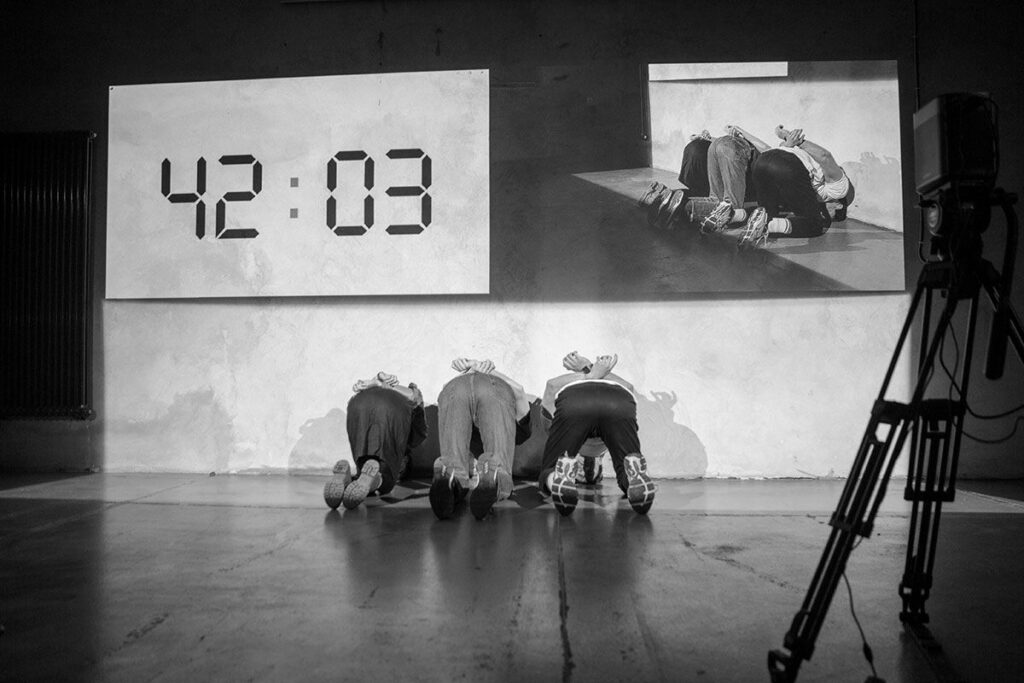Last Sunday, two events at the Theatertreffen were dedicated to the situation in Belarus.
1446 people were convicted in politically motivated criminal cases in Belarus in 2022: 1284 men and 162 women, including around 140 cultural workers, calculates Vienna-based philosopher Olga Šparaga at the panel discussion „People without Country, Country without People. Belarusian Cultural Opposition“. One percent of all Belarusian citizens are currently in prisons and penal colonies, adds curator and researcher Antonina Stebur. Everyone has someone in their family or among their friends who has been or is being oppressed by the regime, says performer Igor Shugaleev, who lives in exile in Poland. One million people have already left the country since the revolution in 2020. Most of them now live in EU countries, especially Poland and Germany. Since the all-out war in Ukraine, the situation in Belarus has taken a back seat – but, as Stebur points out, in the globalised world everything is interconnected. The fundamentalist government of Iran, which oppresses and murders its own female citizens, is at the same time supporting Russia – as is Lukashenko, who jails opposition activists while allowing weapons for the Russian army to pass through Belarus.
Those who have stayed in Belarus are trying to survive. Those who have left the country feel obliged to speak and write about the situation in their home country so that it does not disappear from the picture altogether. Shugaleev takes up this challenge in a performance developed together with the artist Sergey Shabohin entitled „375 0908 2334 – The body you are calling is currently not available“, which is shown as part of Theatertreffen. The artist offers the audience a collective gesture to draw attention to the situation of political prisoners. He kneels with his head bowed and his hands clasped behind his back, while a voice from a loudspeaker explains that he is adopting the position that opposition members in Belarusian prisons are forced to take. During the performance, the time is counted down: 60 minutes. In a warm voice, Shugaleev asks the audience to join him, to talk to him, or to wait in silence for this hour.
A few people kneel with him, one from Taiwan, one from Hong Kong, one from Germany. The rest of the audience remain in their seats.
On the website of the project – which the artist has already shown in many places and on many occasions – it says that he wants to arouse empathy for the people of Belarus. Shugaleev himself feels obliged to them, and even guilty about not being with them. He defines this as „survivor’s guilt“. The performance is an attempt to show solidarity with the protest movement from the place where he has recently found refuge. The first digits in the title of the performance refer to the area code for Belarus, the next to the beginning of the four days of protests after the rigged elections on 9 August 2020, and the last, to the paragraph of the penal code that the regime uses to legitimise violence against the organisers and participants of the demonstrations. These last numbers of title 2334 also represent the more than 40,000 people arrested during the protests on the basis of this paragraph.
The Belarusian performer’s minimalist gesture is a modest yet powerful counterpoint to the elaborate shows on the Berliner Festspiele’s main stage. It is a reminder of how the tools of art can be used to empathise with people, who are not lucky enough to live in safe places, to pay attention to them and to take the time not to overlook their struggles.
Many people directly affected by the situation in Belarus use the two Sunday festival events (discussion and performance) as an opportunity to meet and share their experiences of life in exile. Among them is the artist Uladzimir Hramovich, who is currently waiting for a visa that will allow him to stay in Germany, and Lizavieta Michalchuk, director of the independent cultural space Prastora KH in Brest, which now only functions online. Most Belarusian cultural practitioners try to continue their work outside their country of origin, despite the many difficulties associated with legalising their stay in the EU.
To the question of how all of us who participated in the discussion and performance can support people in Belarus, the answer is: the most important thing is to raise visibility, to write, to speak, to invite cultural workers to events, to write letters to the prisoners, to donate. So there are possibilities of solidarity that begin with a performative gesture but don’t necessarily have to end there.
